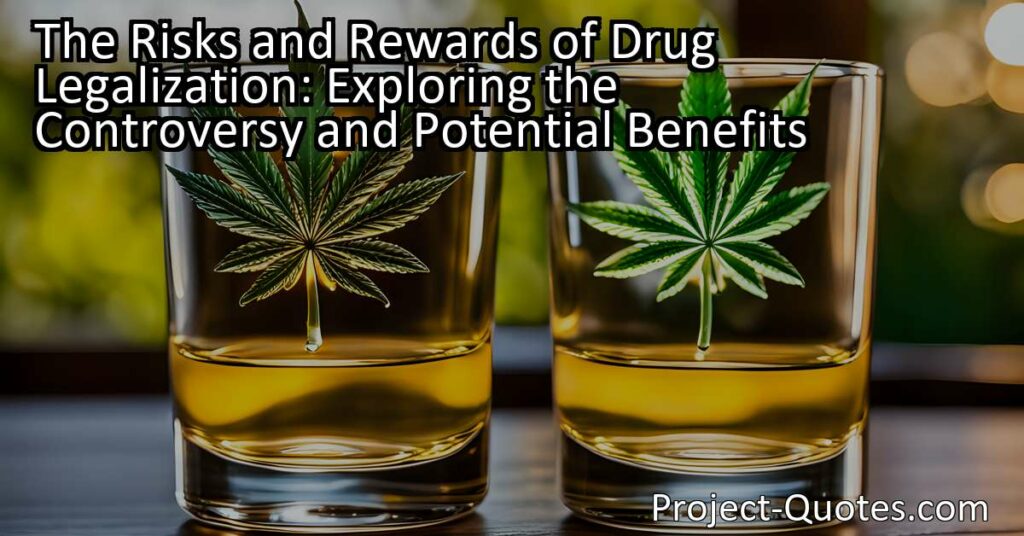But my humble opinion is, I’m not quite sure where I stand on the legalization of drugs – though, if tequila is legal, pot should probably be legal.
Ted Demme
The Risks and Rewards of Drug Legalization: Exploring the Controversy and Potential Benefits The controversy surrounding the legalization of drugs is heated, with strong opinions on both sides. Advocates argue that legalizing drugs like marijuana could bring economic benefits and safer consumption practices, while opponents worry about increased addiction rates and societal problems. The debate requires careful analysis and consideration of various factors, highlighting the need for an open and informed dialogue to prioritize the well-being of society.
Table of Contents
- 1 But my humble opinion is, I’m not quite sure where I stand on the legalization of drugs – though, if tequila is legal, pot should probably be legal.
- 2 Ted Demme
- 3 Meaning of Quote – But my humble opinion is, I’m not quite sure where I stand on the legalization of drugs – though, if tequila is legal, pot should probably be legal.
- 4 Freely Shareable Quote Image
- 5 Related
Meaning of Quote – But my humble opinion is, I’m not quite sure where I stand on the legalization of drugs – though, if tequila is legal, pot should probably be legal.
In the realm of controversial topics, few are as polarizing as the debate over the legalization of drugs. People from various walks of life have strong opinions on this matter, often arguing for or against it based on their personal beliefs and experiences. Nonetheless, finding a middle ground can sometimes be challenging, especially when the discussion revolves around substances such as marijuana and tequila. As Ted Demme suggests, if tequila is legal, then perhaps the legalization of pot should also be considered.
To delve deeper into this notion, it is crucial to understand the reasons behind the divide on drug legalization. Advocates in favor of legalization often emphasize the potential benefits, such as increased tax revenue, reduced strain on the criminal justice system, and improved regulation. On the other hand, opponents express concerns about the societal implications, including potential health risks, increased addiction rates, and the potential for drug abuse to cause harm to individuals and communities alike. Balancing these opposing viewpoints requires considering both the potential benefits and drawbacks of drug legalization.
One argument in favor of legalizing drugs, including marijuana, is the potential economic benefits it could bring. By regulating and taxing the sale and distribution of these substances, the government could inject much-needed revenue into public coffers. Additionally, it could potentially alleviate the financial strain of enforcing drug-related laws and incarcerating non-violent offenders. Proponents argue that these resources could be better utilized in education, healthcare, and addiction treatment programs, ultimately benefiting society as a whole.
Furthermore, proponents of legalization argue that regulating drug use would allow for safer consumption practices. People who obtain drugs from illicit sources often face risks associated with the lack of quality control, potentially ingesting impure or dangerous substances. By legalizing and regulating drugs, users would have access to safer products sold by licensed vendors, reducing the potential harm associated with their consumption. This could also enable the implementation of educational campaigns to promote responsible drug use and mitigate potential health risks.
However, opponents of drug legalization voice concerns about the potential consequences of granting legal status to substances like marijuana. They argue that legalization may lead to increased usage rates, particularly among young and vulnerable populations. These opponents fear that greater access to drugs could exacerbate addiction rates, negatively impacting individuals and their families. Additionally, they believe that legalization could normalize drug use and potentially lead to a host of social problems, including impaired productivity, increased crime rates, and strained healthcare systems.
When considering the argument that “if tequila is legal, pot should probably be legal,” it is essential to acknowledge the differences between these two substances. Tequila is an alcoholic beverage typically consumed in moderation, while marijuana contains psychoactive compounds that can induce altered states of consciousness. Critics of this comparison argue that alcohol and marijuana affect users differently. They claim that the societal and health consequences associated with alcohol abuse differ significantly from those of marijuana use, as excessive alcohol consumption is more likely to lead to violence and impaired judgment compared to marijuana consumption.
Nonetheless, supporters of legalization argue that the comparison between tequila and pot is valid in terms of societal acceptance. They question why a substance with potential harmful consequences like alcohol is readily available while marijuana, which many argue has both medicinal and recreational benefits, remains illegal or heavily regulated in many places. This highlights the inconsistent approach to drug policy and prompts further examination of the societal impact of different substances.
To address concerns regarding the potential negative effects of marijuana legalization, proponents frequently point to the experience of states or countries that have already legalized the drug. For instance, several U.S. states, including Colorado, Washington, and California, have embraced marijuana legalization, allowing researchers to study its effects on public health and social dynamics. These studies consistently show that marijuana legalization has not led to significant increases in usage rates among youth nor a surge in the overall societal problems predicted by opponents. Thus, proponents argue that this evidence supports the need for a more rational approach to drug policy.
In conclusion, the debate surrounding the legalization of drugs is complex and multifaceted. Both supporters and opponents of drug legalization present valid arguments based on their beliefs, experiences, and potential societal implications. Ted Demme’s quote, “But my humble opinion is, I’m not quite sure where I stand on the legalization of drugs – though, if tequila is legal, pot should probably be legal,” offers a thought-provoking perspective to explore further. By weighing the potential economic benefits, public health considerations, and societal impacts, it becomes clear that the question of drug legalization requires careful analysis and consideration of various factors. Ultimately, finding common ground in this contentious debate demands an open and informed dialogue that prioritizes the overall well-being and best interests of society.
I hope this quote inspired image brings you hope and peace. Share it with someone who needs it today!


